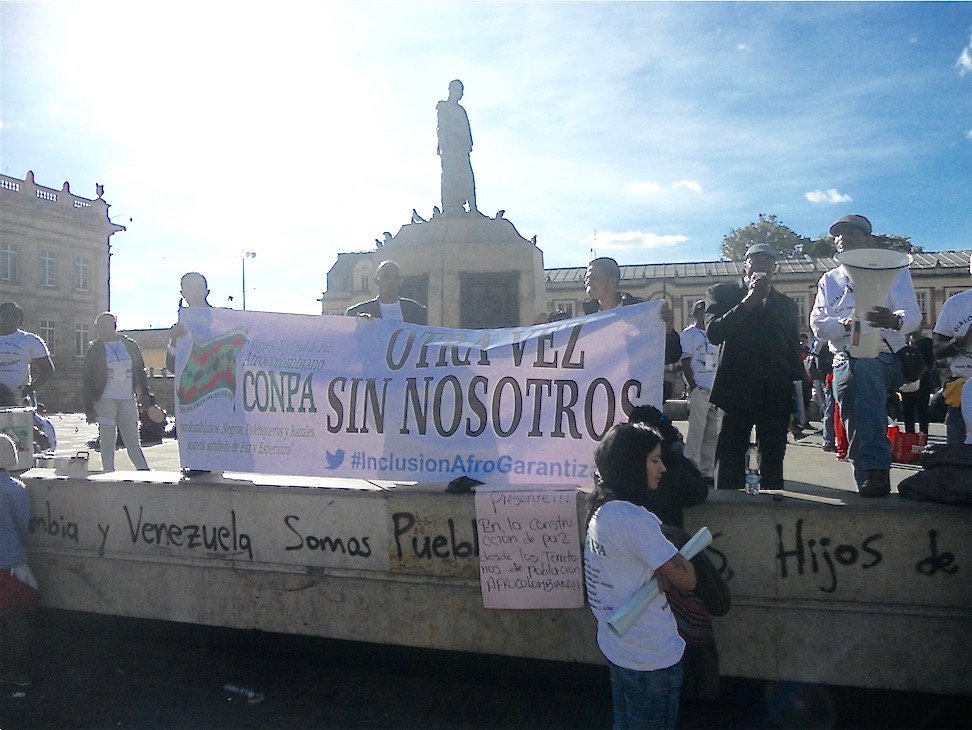Representatives of Colombia’s Ethnic Groups to be Welcomed in Havana by Peace Negotiators: A Balanced Analysis
Bogota, June 3, 2016. The International Institute on Race, Equality and Human Rights celebrates the joint statement #73 published on June 2 by the Colombian government and FARC guerrillas, where they announced that on June 21 and 22 they will welcome in Havana representatives of Colombia’s ethnic groups, “with the objective of helping to ensure […]

Bogota, June 3, 2016.
The International Institute on Race, Equality and Human Rights celebrates the joint statement #73 published on June 2 by the Colombian government and FARC guerrillas, where they announced that on June 21 and 22 they will welcome in Havana representatives of Colombia’s ethnic groups, “with the objective of helping to ensure the ethnic, territorial and differential approach in the implementation of the agreements about the different points of the agenda and in this dimension consolidate the respect and protection of ethnic and cultural diversity.” Given the delay in facilitating such a dialogue and the imminent signing of the Accords, an analysis of the implications of the opening of such a space is crucial. Specifically, an assessment should be made regarding how this might contribute to an effective implementation of the Accords that guarantees the protection, promotion and restitution of the ethnic communities affected by the armed conflict.
The opening of this space responds to the requests for participation that have been made by sectors within these groups since negotiations began, including the National Afro-Colombian Council for Peace (CONPA) and the Ethnic Commission for Peace and the Defense of Territorial Rights, coalitions that group hundreds of thousands of Afro-Colombians and indigenous impacted by the armed conflict. In an advocacy campaign based on a rigorous analysis of the Accords, these groups have offered specific proposals to correct omissions regarding an adequate differential ethnic approach. Unfortunately, despite having received CONPA’s and the Ethnic Commission’s proposals, the Negotiating Table has not formally responded to their requests to be invited to Havana. In today’s statement, neither CONPA nor the Ethnic Commission are explicitly named as participants in the delegations that will travel to Cuba. Having closely followed these groups’ work and attesting to their broad legitimacy with grassroots and community organizations, the Institute on Race, Equality and Human Rights expresses its hope that the Negotiating Table will guarantee their participation in the delegation.
Regardless of which representatives attend, to ensure the adoption of a differential ethnic approach in the implementation of the peace accords, the agreement must include clauses in the final texts that specifically protect the ethnic-territorial rights of Afro-Colombians and indigenous people—a request repeatedly made by CONPA and the Ethnic Commission. If the government and FARC limit themselves to merely listening to the analysis and proposals of Afro-Colombian and indigenous representatives without an explicit commitment to improve the the language in the Accords from an ethnic perspective, then the effort will remain a symbolic one and the Accords’ deficiencies will remain in place.
However, while the inclusion of specific clauses to safeguard ethnic-territorial rights will help to ensure that these rights are respected during the implementation of the Accords, it is no guarantee that this will happen. Institutional processes by which the Accords will be implemented will be the determining factor in guaranteeing the rights of ethnic communities. The drafting and passage of laws that will “ground” the Accords and lay the foundation for State institutions to design and execute specific policies and programs should be the primary focus of the government and civil society to correct that which is left out by the Accords. For example: producing an adequate analysis on the differential impact of the conflict on ethnic communities and the corresponding measures to be taken to provide restitution.
The signing of the Peace Accords will not be the end to the conflicts that have contributed to the structural exclusion of Colombia’s ethnic communities—conflicts that have been exacerbated by the country’s civil war. Afro-Colombians and indigenous peoples have the hope that the cessation of military hostilities between the FARC and the government will bring about a reduction of violence in their communities. But the signing of the Accords represents a mere starting point in building peace. More than a post-conflict, ethnic communities will face a post-accord scenario wherein the majority of conflicts will continue. Even more worrisome, other conflicts may emerge as a consequence of implementing peace agreements that do not included an adequate ethnic differential approach. The proposals made by CONPA and the Ethnic Commission, as well as those made by other sectors in the ethnic communities, offer a path toward ensuring the protection of their hard-fought rights and ensuring a sustainable peace for the entire country. In order to ensure that the work carried out this June 21-22 contributes to this end and does not merely end up a symbolic gesture, the government and FARC should guarantee the inclusion of CONPA and the Ethnic Commission in the delegation to Havana and heed their well-thought proposals.
To read the joint statement #73 (in Spanish) click here.

